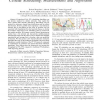Free Online Productivity Tools
i2Speak
i2Symbol
i2OCR
iTex2Img
iWeb2Print
iWeb2Shot
i2Type
iPdf2Split
iPdf2Merge
i2Bopomofo
i2Arabic
i2Style
i2Image
i2PDF
iLatex2Rtf
Sci2ools
TON
2016
2016
Exploiting Mobility in Proportional Fair Cellular Scheduling: Measurements and Algorithms
—Proportional Fair (PF) scheduling algorithms are the de-facto standard in cellular networks. They exploit the users’ channel state diversity (induced by fast-fading), and are optimal for stationary channel state distributions and an infinite time-horizon. However, mobile users experience a non-stationary channel, due to slow-fading (on the order of seconds), and are associated with basestations for short periods. Hence, we develop the Predictive Finite-horizon PF Scheduling ((PF)2 S) Framework that exploits mobility. We present extensive channel measurement results from a 3G network and characterize mobility-induced channel state trends. We show that a user’s channel state is highly reproducible and leverage that to develop a data rate prediction mechanism. We then present a few channel allocation estimation algorithms that rely on the prediction mechanism. Our trace-based simulations consider instances of the PF2 S Framework composed of combinations of prediction and channel a...
TON 2016 |
Related Content
| Added | 11 Apr 2016 |
| Updated | 11 Apr 2016 |
| Type | Journal |
| Year | 2016 |
| Where | TON |
| Authors | Robert Margolies, Ashwin Sridharan, Vaneet Aggarwal, Rittwik Jana, N. K. Shankaranarayanan, Vinay A. Vaishampayan, Gil Zussman |
Comments (0)

